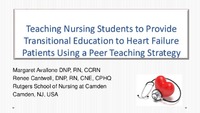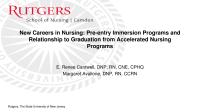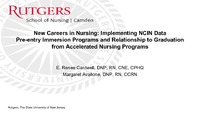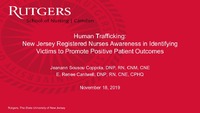| dc.description.abstract | <p>Session presented on Thursday, July 23, 2015:</p>
<p><strong>Background:</strong> Heart failure (HF) affects an estimated 26 million individuals across the world and is the leading cause of hospitalization in the United States and Europe (Ambrosy et al., 2014). In the United States, up to 20% of patients hospitalized for HF are readmitted within 30 days (Fida and Pina, 2012). Approximately 80% of patients with HF are over the age of 65 and are challenged to learn complex self-care skills to manage this syndrome (Ding, Yehle, Edwards, & Griggs, 2014). Nurses must possess not only knowledge of heart failure self-care principles but must have a skill set that enables them to prepare HF patients for a safe transition to home. Though pre-licensure nursing students may learn HF concepts and transitional care content as part of the regular curriculum, nursing students in the Adult Health and Illness I Course were observed to lack the necessary knowledge, skills, and confidence to provide comprehensive HF education to patients and families. HF education must include disease-specific content, management across the continuum of care, and health literacy strategies. Teach-Back is an evidence-based health literacy educational strategy that provides effective patient education at the health literacy level of the patient and caregiver (Rudd, 2010). Teach-Back was associated with effective knowledge retention when implemented in a population of heart failure patients (White, Barber, Carroll, Brinker, & Howie-Esquivel, 2013). Peer teaching partnerships have been used successfully to enhance cognitive and psychomotor development, increase confidence and satisfaction with the learning experience, and promote professional development (Goldsmith, Stewart, Ferguson, 2006, Secomb, 2007). Peer teaching and learning also supports teamwork and develops leadership and communication skills (Secomb, 2007) Purpose: The purpose of this project was to evaluate the effectiveness of a peer taught Transitional HF Educational Program to provide accelerated baccalaureate nursing students with the knowledge, skills and confidence necessary to provide patient-centered HF education to patients and families. The Institute for Healthcare Improvement (IHI) and Transforming Care at the Bedside (TCAB): Creating an Ideal Transition Home for Patients with Heart Failure (Nielson, 2008) provided the basis for the program curriculum.</p>
<p><strong>Methods:</strong> A quantitative pre-test, post-test design was used. Sixty second-semester accelerated baccalaureate nursing students enrolled in the Adult Heath and Illness I Course were invited to participate. Additionally, senior (fourth semester) students who were serving as Academic Ambassadors were invited to be peer teachers. The Academic Ambassador program is an existing program within the School of Nursing that develops student leadership skills through focused academic and community services. Ambassadors are required to meet rigorous academic standards, attend educational sessions, and submit tutoring and community service hours. Fifty-three second-semester students participated in the program, and nine senior level nursing students served as peer teachers. Faculty provided the Transitional HF Program education for the peer teachers in a two-hour session prior to the program. Peer teachers demonstrated proficiency in program topics prior to the educational intervention. The Transitional HF Program consisted of a two-hour session that included HF didactic, case study, and role-play activities. Topical content, derived from the IHI/TCAB document, served as the curricular guide and included HF disease management strategies including transitional care concepts, essential elements of HF education, and Teach-Back methodology. Senior (fourth semester) nursing students acted as peer teachers to present program content, participate in role-play activities, and help facilitate small group sessions. Peer Teachers role-played effective and ineffective examples of HF education and Teach-Back and then facilitated student discussion. During the small group sessions, the Adult Health students had the opportunity to role-play HF education and Teach-Back skills within small groups of three, taking tuRNas patient, nurse and observer. Peer Teachers also facilitated the role-play within the small groups. Faculty provided support for the peer teachers before and during the educational sessions, and facilitated the interactions during role-play. The study was reviewed and received exempt status by the Institutional Review Board of the University. Analysis and Summary of</p>
<p><strong>Results:</strong> The Transitional HF Education Program was offered Fall semester of 2013 and Spring of 2014. Examinations of change scores were conducted by paired t-tests. Instructor-designed pretests and posttests were used to measure the difference in knowledge and confidence resulting from participation in the Transitional HF Educational Program. Second semester Adult Health students demonstrated significant improvement in identifying essential elements of HF patient education defined by the IHI and TCAB: Creating an Ideal Transition Home for Patients with Heart Failure (2008) in a pre and posttest comparison, improving from 45.8% to 77%. (p<.0001). Additionally, the education significantly improved the Adult Health students' knowledge of escalating signs of HF from 41% to 83% and ability to perform Teach-Back (43% to 86%, p<.001 for both measures). Confidence in HF assessment skills, patient education skills, and Teach-Back technique significantly improved, increasing from 17% to 94% (p<.0001). The Adult Health students and Senior peer teachers overwhelmingly described the program as an effective method for teaching HF patient education.</p>
<p><strong>Recommendations:</strong> Using the IHI and TCAB Transitional Heart Failure Education (Nielson et al., 2008) template provides an exemplar for nursing students to learn transitional care education concepts to promote care across the continuum. Instructing students in the use of Teach-Back technique provides an evidence-based, patient-centered method for teaching patients. Using upper level peers to facilitate education provides an effective, safe and satisfying way for the Adult Health students to practice new techniques through role-play. Additionally, this Program is highly adaptable for the education of nurses caring for patients in a variety of settings across the healthcare continuum. The Transitional HF Education Program may improve the quality of transitional care for patients with chronic diseases and prevent unnecessary readmissions by better preparing the emerging workforce.</p> | en |





